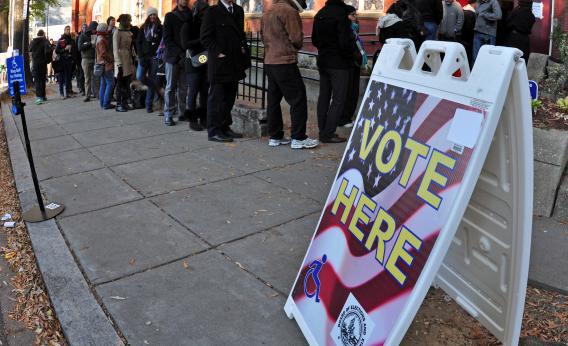John Harris and Jonathan Martin have a piece in Politico lamenting the ways in which the 2012 campaign “turned small” and in fact became “the most garish and debased election of the modern era.” Greg Sargent counters that, no, it was a campaign of big ideas.
I’d say this was a campaign about medium-sized ideas. Where I’m most sympathetic to Sargent’s view is just that I think pundits tend to vastly overstate the quality of past campaigns. It’s really instructive to actually look at some historical campaign ads and see how vacuous they used to be. In the ‘50s you had total nonsense jingles. Back in 1976, Jimmy Carter tried to convince southerners to vote for him basically just on the basis of his accent and based on the outcome it seems to have worked. In retrospect, Ronald Reagan’s 1980 victory was a major ideological watershed moment, but his campaign ads seemed deliberately designed to obscure this.
As Sargent says, the gaffe-centric nature of the 2012 campaign felt a bit silly at times, but both the “you didn’t build that” and “47 percent” controversies were in some sense about real governing ideas. Romney feels that Democrats underrate the role of ambitious entrepreneurs in driving prosperity while Obama charges that Republicans don’t safeguard the interests of the vulnerable.
If anything, my beef with this campaign is that the ideas at play aren’t really as big as the contenders like to say. Paul Ryan, in particular, has a tendency to paint the clash between federal spending at 18 percent of GDP and federal spending at 22 percent of GDP in apocalyptic terms but you see smaller versions all around. The ferocious rhetorical fight around Medicare, in particular, obscured two plans that are actually pretty similar. Rather than a drastic clash between two fundamentally different worldviews, what I think you see 2012 is a medium-sized disagreement between two ideas about tax policy. The Republican Party thinks that low marginal income tax rates are very important to economic growth, and that low marginal income tax rates on highly paid workers and capital income are especially important. The Democratic Party, by contrast, thinks that providing health care and education services to the non-rich is extremely important. Both parties believe we should more-or-less have a market economy and that the government should spend lots of money on bolstering the living standards of the elderly. But they have a real disagreement about this tax issue. Will low taxes create so much growth that nobody even misses their food stamps or student loans or nursing home coverage, or does broad-based prosperity require income redistribution and service provision?
That’s an important argument, and I think it’s run very clearly through the campaign. I don’t see an equivalent of Alabama voting for Jimmy Carter happening this time. Basically everyone in America understands that if you want lower taxes and lower social welfare spending, you vote for Romney whereas if you want the reverse you vote for Obama. The stakes are only medium-sized, but that’s good. In Greece they have fascists and communists on the ballot and I don’t envy them. But Romney and Obama stand for different things, and it’s not too hard to tell what those things are.
